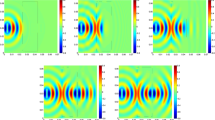Abstract
In this paper, we develop both a fourth order explicit scheme and a compact implicit scheme for solving the metamaterial Maxwell’s equations. A systematic technique is introduced to prove stability and error estimate for both schemes. Numerical results supporting our analysis are presented. To our best knowledge, our convergence theory and stability results are novel, and provide the first error estimate for the fourth order finite difference methods for Maxwell’s equations.
Similar content being viewed by others
References
Bokil, V.A., Gibson, N.L.: Analysis of spatial high-order finite difference methods for Maxwell’s equations in dispersive media. IMA J. Numer. Anal. 32(3), 926–956 (2012)
Brenner, S.C., Gedicke, J., Sung, L.-Y.: An adaptive P 1 finite element method for two-dimensional transverse magnetic time harmonic Maxwell’s equations with general material properties and general boundary conditions. J. Sci. Comput. 68(2), 848–863 (2016)
Demkowicz, L., Li, J.: Numerical simulations of cloaking problems using a DPG method. Comput. Mech. 51(5), 661–672 (2013)
Fang, J.: Time-Domain Finite Difference Computations for Maxwell’s Equations, Ph.D dissertation, EECS Dept., Univ. of California, Berkeley CA (1989)
Fathy, A., Wang, C., Wilson, J., Yang, S.: A fourth order difference scheme for the Maxwell equations on Yee grid. J. Hyperbolic Diff. Equa. 5(3), 613–642 (2008)
Hao, Y., Mittra, R.: FDTD Modeling of Metamaterials: Theory and Applications. Artech House Publishers, Boston (2008)
Hesthaven, J.S.: High-order accurate methods in time-domain computational electromagnetics: A review. In: Advances in Imaging and Electron Physics. Elsevier BV, pp. 59–123 (2003)
Li, J., Hesthaven, J.S.: Analysis and application of the nodal discontinuous Galerkin method for wave propagation in metamaterials. J. Comput. Phys. 258, 915–930 (2014)
Li, J., Huang, Y.: Time-Domain Finite Element Methods for Maxwell’s Equations in Metamaterials, Springer Series in Computational Mathematics, vol. 43. Springer (2013)
Li, J., Shi, C., Shu, C.-W.: Optimal non-dissipative discontinuous Galerkin methods for Maxwell’s equations in Drude metamaterials. Comput. Math. Appl. 73, 1760–1780 (2017)
Li, J., Shields, S.: Superconvergence analysis of Yee scheme for metamaterial Maxwell’s equations on non-uniform rectangular meshes. Numer. Math. 134, 741–781 (2016)
Li, W., Liang, D., Lin, Y.: A new energy-conserved s-fdtd scheme for Maxwell’s equations in metamaterials. Int. J. Numer. Anal. Mod. 10, 775–794 (2013)
Mattsson, K., Nordström, J.: High order finite difference methods for wave propagation in discontinuous media. J. Comput. Phys. 220(1), 249–269 (2006)
Monk, P., Süli, E.: A convergence analysis of Yee’s scheme on nonuniform grid. SIAM J. Numer. Anal. 31, 393–412 (1994)
Xie, Z., Wang, J., Wang, B., Chen, C.: Solving Maxwell’s equation in meta-materials by a CG-DG method. Commun. Comput. Phys. 19(5), 1242–1264 (2016)
Yang, Z., Wang, L.-L., Rong, Z., Wang, B., Zhang, B.: Seamless integration of global Dirichlet-to-Neumann boundary condition and spectral elements for transformation electromagnetics. Comput. Methods Appl. Mech. Engrg. 301, 137–163 (2016)
Yee, K.S.: Numerical solution of initial boundary value problems involving Maxwell’s equations in isotropic media. IEEE Trans. Antennas Propagat. 14, 302–307 (1966)
Yefet, A., Turkel, E.: Fourth order compact implcit method for the Maxwell equations with discontinous coefficients. Appl. Numer. Math. 33, 125–134 (2000)
Yefet, A., Petropoulos, P.G.: A staggered fourth-order accurate explicit finite difference scheme for the time-domain Maxwell’s equations. J. Comput. Phys. 168, 286–315 (2001)
Zhao, S., Wei, G.W.: High order FDTD methods via derivative matching for Maxwell’s equations with material interfaces. J. Comput. Phys. 200, 60–103 (2004)
Acknowledgements
The authors are very grateful to Peter Monk for his insightful comments on an early version of the paper, which have been adopted to improve the paper. We also thank two referees for their helpful comments on improving our paper.
Author information
Authors and Affiliations
Corresponding author
Additional information
Communicated by: Aihui Zhou
Work supported by NSF grant DMS-1416742 and NSFC project 11671340.
Rights and permissions
About this article
Cite this article
Li, J., Chen, M. & Chen, M. Developing and analyzing fourth-order difference methods for the metamaterial Maxwell’s equations. Adv Comput Math 45, 213–241 (2019). https://doi.org/10.1007/s10444-018-9614-8
Received:
Accepted:
Published:
Issue Date:
DOI: https://doi.org/10.1007/s10444-018-9614-8




